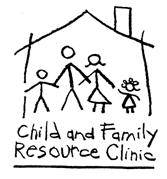Child and Family Resource Clinic
- Association of Graduate Students in Higher Education
- Bill J. Priest Center
- bjpc_academic_travel_form
- Center for Play Therapy
- Center for Sport Psychology
- Child and Family Resource Clinic
- Consortium for Animal Assisted Therapy
- Counseling and Human Development Center
- Doctoral Student Association
- index
- UNT Integrated Care and Behavioral Health
- Kappa Delta Pi
- Pathways for Future Teachers
- Project Communicate
- Student Council for Exceptional Children
- UNT ELEVAR
- UNT Integrated Care and Behavioral Health
- The UNT Kristin Farmer Autism Center
- Office of Gifted and Talented Education
 The Child and Family Resource Clinic is a counseling and training clinic that serves
the Denton County community. The CFRC offers counseling to children, adolescents,
adults, couples, and families for issues including learning, emotional, and adjustment
difficulties. The CFRC's purpose is twofold: to provide professional and responsible
services to clients who request them and professional, competent training for graduate
students.
The Child and Family Resource Clinic is a counseling and training clinic that serves
the Denton County community. The CFRC offers counseling to children, adolescents,
adults, couples, and families for issues including learning, emotional, and adjustment
difficulties. The CFRC's purpose is twofold: to provide professional and responsible
services to clients who request them and professional, competent training for graduate
students.
Program Director
Dr. Dina Yousef, PhD, LPC-S, NCC, RPT-SCertified CCPT-S; Certified CPRT-S
Office Location
Matthews Hall Annex1180 Union Circle
Denton, TX 76203
Contact
Counseling Services
- Adult & Adolescent Counseling
- Services include support counseling for personal growth as well as emotional challenges such as life transition, depression, anxiety, anger, relationship, self-esteem, and other concerns.
- Child Counseling
- Services include individual and group play therapy.
Parent Education Services include parent education classes and individual parent education
for purposes of improvement of parenting skills as well as the parent-child relationship.
Parent Education
The Child and Family Resource Clinic offers on-going parent education classes and
support groups. We also offer parent education on an individual basis. Counselors
work with parents, helping them to develop parenting skills, and providing an encouraging
and supportive environment.
The CFRC offers specialized parent education services known as filial therapy. Filial
therapy is defined as
a unique approach used by professionals trained in play therapy to train parents to be therapeutic agents with their own children through a form of didactic instruction, demonstration play sessions, required at-home laboratory play sessions, and supervision in a supportive atmosphere. Parents are taught basic child-centered play therapy principles and skills including reflective listening, recognizing and responding to children's feelings, therapeutic limit setting, building children's self-esteem, and structuring required weekly play sessions with their children using a special kit of selected toys. Parents learn how to create a nonjudgmental, understanding, and accepting environment that enhances the parent-child relationship, thus facilitating personal growth and change for child and parent. (Landreth & Bratton, 2006, p. 11)
For more information
940-565-2066
CFRCPaperwork@unt.edu
Psychoeducational Assessment Services include interdisciplinary assessment for children
between the ages of 6 and 16 years old. Assessments evaluate a child's intellectual
and learning abilities, speech and language concerns, and emotional or psychological
challenges.
Psychoeducational Assessment
The Child and Family Resource Clinic offers psychoeducational assessment services
to children ages 6 to 16. A team comprised of counseling and speech/language/hearing
specialists conduct a thorough evaluation over a three-day period. The interdisciplinary
team meets following the evaluation to share knowledge and impressions gathered during
the testing. Team members then meet with the child's parents to report their findings
and make recommendations and suggestions for helping the child both academically and
emotionally. This comprehensive assessment is offered to families with children and/or
adolescents who are experiencing difficulties at school or home.
CFRC's psychoeducational assessment evaluates the following areas:
- Intellectual functioning
- Learning processes (e.g., visual vs. auditory learning)
- Memory skills
- Visual-motor integration
- Behavioral functioning
- ADHD screening
- Anxiety and/or depression screening
- Self-concept and self-esteem
- Parent-child relationship
- Articulation: ability to produce speech sounds
- Expressive language: use of language including grammar and vocabulary in conversation and/or narratives
- Receptive language: understanding of language including following directions and knowledge of word relationships
- Voice: quality of voice
- Fluency: rhythm of speech
- Hearing screening: identify if further evaluation is needed regarding hearing ability and auditory processing skills
- Reading: ability to read real and nonsense words; accuracy, speed, and comprehension when reading paragraphs
- Writing: ability to construct sentences and paragraphs and use of mechanics
- Math: use of basic calculation skills and math problem solving
For more information
940-565-2066